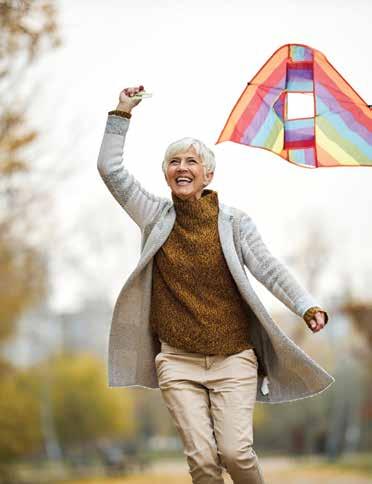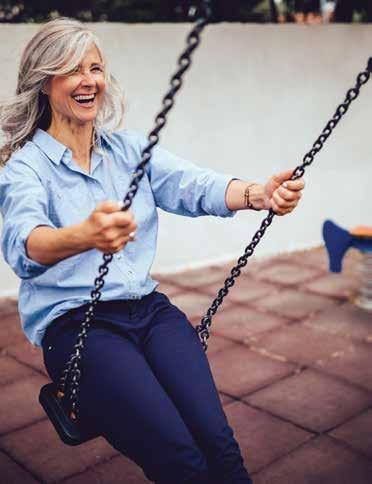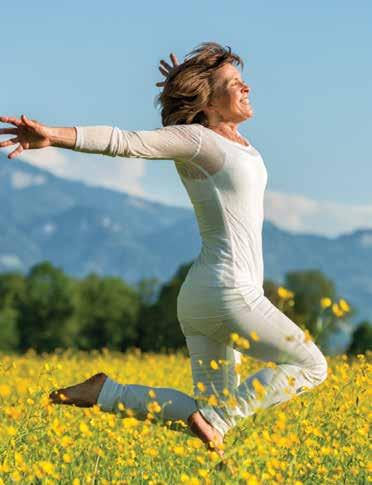
6 minute read
The Happiness Factor
Why finding happiness is critical to healthy aging

Advertisement
BY REBECCA GATTO
Getting older can be disheartening, depressing, even scary. Our bodies start to work less well, friends and partners increasingly face health issues, and we start to realize that the road ahead is a lot shorter than it once was.
Demographic research suggests, however, that getting older doesn’t have to rob us of our joy. In fact, according to Psychology Today, most happiness studies that compare the relative life satisfaction of generations find a curve that looks like a smile. Younger and older generations tend to be the happiest, with a dip in the middle.
A fact sheet from the World Health Organization identifies the differentiating factor that allows people to enjoy their golden years: health. When people feel good, they’re able to pursue their passions, learn new things, support their communities, and make the most of the wisdom they’ve gained from decades of rich experience.
While some part of this is genetic, most, according to the WHO, can be attributed to people’s environments. That includes not only the safety and accessibility of their homes and communities, but also their social support network. These contributing factors, the WHO points out, are largely dependent upon circumstance and means.
Still, there are steps individuals can take to prolong their happy, healthy years particularly if they adopt behaviors that improve physical and mental health. A landmark Harvard study that followed a group of students for nearly eight decades discovered that certain personal choices reliably predicted a better late-life experience, especially if people started “investing” in their future health while they were still young.
Whether we like it or not, following boilerplate health advice like quitting smoking, avoiding alcohol, eating whole foods, and taking daily walks can make a world of difference in how it feels to get older. But, the researchers discovered, intangible pursuits can be just as critical. People who continued learning, creating, and living a vibrant social life were much happier as time went on.
Strong second acts
Take, for example, Leslie Yolen. After college, she hoped to pursue a career in art. But life presented its own obstacles. After a divorce, a move, and a career change, her goals revolved around simply making ends meet for herself and her son there’s that difficult midlife dip that’s often reflected in happiness research.
Still, a successful career in education empowered her to support her family while still keeping her passions in the picture. First, she worked as a classroom art educator in the Niskayuna Central School District, then later as arts education associate for the New York State Education Department’s Office of Curriculum and Instruction. Yolen is proud of what she accomplished during her time working in the State Education Department, but it was hard work. Dreams of becoming a full-time artist had to wait.
“All my time and energy was sucked into kids and school,” she says. “I couldn’t really do my own art at the level that I wanted to.”
Now, Yolen is 67 years old, approaching five years in retirement, and currently preparing for her next sculpture show. She has handily picked up the thread of her self-described “starving artist” days, minus the financial struggles. Her days are spent playing with two Great Danes that she adopted as puppies, stoking the wood fires in her home, and painting or sculpting in her studio, which is visible from her living room window.
“I’ve really embraced my artwork and tried to sort of make up, I guess, for a little lost time,” she says.
That’s not to say Yolen hasn’t had to contend with some of the common physical limitations that accompany additional candles on the birthday cake. For instance, she also loves crafting pottery, but can no longer spend the hours hunched over a wheel that the medium requires.
“I started to have back issues from being a potter,” she says. “I have, basically, sciatica, which is impacting my lifestyle here of gardening and heating with wood and running around with these big beasts,” her beloved dogs. She says her next big move will be to a smaller home.
Despite the challenges that come with picking a passion back up later in life, Yolen has developed a perspective on life that enables her to enjoy the benefits, too.

“All that worry about money and making ends meet is gone,” she says. “It was worth it all. I gave up my best years, but I’m trying to be really grateful for the time I have and the space I have and this beautiful place that I have.”
Staying flexible and going with the flow

A positive mindset has also contributed to new and rewarding endeavors for Doreen Bishop, who will celebrate her 65th birthday in July.
“There are more years behind me than there are in front of me,” Bishop says. “As you get older, you’re always shocked at where you are.”
Bishop is now a popular teacher at The Hot Yoga Spot, where she originally signed up for classes as a student because she wanted to lose some weight. “I was starting to feel old,” she says.
But yoga, Bishop discovered, offered more than just an opportunity to burn some calories. It gave her space to care for herself holistically. She eventually earned her teaching certification simply because she enjoys learning new things and being part of a strong community both of which are activities recognized by the WHO as contributing to healthy and happy aging.
It might seem like a daunting leap to go from following along in class to joining the studio’s staff. But Bishop says she’s discovered that getting older has emboldened her decision-making, because time feels more limited.
“You’re kind of at the end, but also you’re hoping that the choices that you’ve made, and continue to make, can extend that a little more,” she explains. “Yoga gives you the ability to also take more chances and have more confidence to try other things.”
In fact, in the past two years, Bishop has launched into her interests in a big way, starting two more new careers. She’s become certified as a phlebotomist and works as a medical assistant at The Bone and Joint Center and she attributes her confidence to yoga.
“I hope I inspire people,” she says. “That’s why I don’t mind telling my age, because I want people to realize that at this age, you can still be really evolved and active. It’s never too late to try something new.”
Plus, she says, getting older may come with some difficulties, but it also has its benefits. “When you’re younger, you’re just trying to get through the day,” she says. “Everything focuses on your children or you have a full-time job. I just think it’s a different mindset for sure.
“Generally as you get to my age, your children are grown, they have their own lives,” she continues. “It’s just you to take care of, so you have more time to maybe reassess your goals as you get older and try to take that time for yourself.”
For Bishop, there’s an added bonus. She hopes to pave the way for her own daughters to age confidently, and to know that they can always try new things. And she plans to be there to witness it all.
“I want to see them have their own families,” she says. “That’s a motivating factor to keep going. You don’t want to get to the point where you’re sitting in the chair watching them.”
Aging happily into the future
Remember that data that suggested happiness has a U-shaped curve throughout people’s lifetimes? There’s a caveat, and it’s a big one.
That pattern holds true, researchers found in 2022, only for middle-income individuals. People with severe financial hardship become less happy as they get older, with a small uptick around traditional retirement years. And wealthy people’s happiness stays fairly constant throughout life.
Based on the latest research and the WHO’s recent guidance, then, it’s not terribly surprising that retirement success stories abound in the Capital Region. Even in comparison to other parts of New York State, our region boasts low poverty rates.
But as populations gray, both worldwide and at home, the question of how to stay happy as we age will only become more important. A 2019 report by the Center for an Urban Future found that New York State has 3.2 million residents aged 65 and up more than the entire population of 21 other states. That meant that almost one in six New Yorkers were of retirement age, a record-setting fraction that experts expect will continue growing.
According to New York State Office for the Aging’s 2021 annual report, the services aging people need most right now include transportation, personal care, and help managing chronic diseases. The key to success, the report says, is to integrate social services with clinical care. In other words, a holistic approach works best, not just on an individual level, but on a large scale.
Graduating out of middle age doesn’t have to be scary. With the right support and a healthy mindset, people in their 60s, 70s, 80s and beyond are trying new things, supporting their families in new ways, and rediscovering what it means to be themselves.
As Bishop, who has six grandchildren, puts it: “Grandparents have changed. Grandparents don’t just wear aprons and bake cookies. There’s a lot more to us than that now.” n











